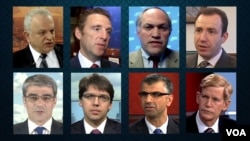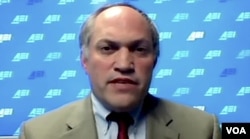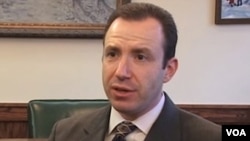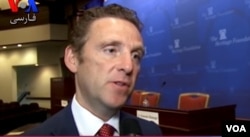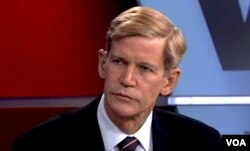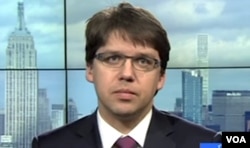With Hassan Rouhani starting his second term as Iran's president, VOA Persian remembers that three years ago, American observers Reuel Mark Gerecht and Ali Alfoneh wrote a political portrait of Hassan Rouhani titled "The Man and the Myth: The many faces of Hassan Rouhani" where they traced the life of Hassan Fereydoun - from his birth in Sorkheh in Semnan Province to his theology studies at Alavi School in Qom to his long political career and climb through the Islamic Republic's top hierarchy culminating in becoming Iran's president.
Having noted in their long essay that "Rouhani isn't an open book: He has a layered, somewhat closeted personality," Gerecht and Alfoneh attempted to find out if Mr. Rouhani was "More-or-less trustworthy, pragmatic interlocutor with the West or deceptive enemy?"
Today, when Hassan Rouhani has completed his first presidential term is about to embark on his second, VOA Persian has asked the same question from a randomly selected group of prominent U.S.-based and Europe-based Iran-watchers. Here are their answers:
Michael Rubin, Resident Scholar at the American Enterprise Institute, Washington
Rouhani has always been the regime's "Mr. Fix It." His goal is to relieve pressure on the regime, not to reform it. It's no surprise that executions and human rights abuses skyrocket in Iran during periods of diplomatic outreach: The regime is simply signaling that talk of moderation is for external consumption only.
Rouhani hasn't reformed the Islamic Republic nor does he want to do so. His only goal is to consolidate the power--internally and externally--of the Islamic Republic.
Sam Kermanian, Foreign policy analyst, Los Angeles, California
President Rouhani is the seemingly peaceful, calm and kind face, of a regime that in reality and by virtue of its very nature is dictatorial, expansionist, unjust, corrupt and ruthless.
There is little doubt that Rouhani's appearance on the stage concealed many of the characteristics of the regime which he serves and contributed significantly to the deception that the West fell for in its various dealings with the Islamic Republic of Iran. The nuclear deal for which President Rouhani and Foreign Minister Zarif should get the most credit brought the Islamic Republic back from the brinks of total economic collapse and allowed it to re-emerge as a regional power with which its neighbors now need to contend.
Reza Pirzadeh, Member of Iran National Council for Free Elections, Paris
The re-election of the government of “Hope and Wisdom” amounts to extending the life of the Islamic Republic of Iran’s dictatorial regime.
The swearing-in ceremony of the government of “Hope and Wisdom” was held while Iran continues to be plagued with significant domestic and international issues.
Under the slogan “I am not a military man, I am a man of the law,” the government came to power promising it would improve citizens’ livelihoods. The promise remains unfulfilled as Iran struggles under the weight of many complications.
Domestic problems include negative economic growth, hyperinflation, unemployment and poverty, the suppression of civil rights and the oppression of political activists, issues with the environment, the alarming number of executions, and the problems with foreign affairs, the risk of military confrontation, tension with neighbors and burdensome international sanctions. But the vows for improvement were forgotten once JCPOA was inked.
The report card for the first term of the government of “Hope and Wisdom” shows failing grades as the country has seen a steady increase in poverty, unemployment, and pollution levels and little progress in the preservation of the nation’s natural resources. In terms of human costs, Ahmad Shaheed’s UN Special Rapporteur on Human Rights in Iran reports human rights violations in 2014 reached a 20-year high: 852 people executed.
Regionally, Iran continues to promote adventurist, militaristic policies by providing financing and weaponry to Yemeni Shiite rebels, intervening in Iraq’s domestic affairs, and setting up military bases in Syria and dispatching paramilitary forces to support Bashar al-Assad, forces which commit atrocities against the Syrian population. All this while spewing its nearly four decades-long animosity against Israel and the United States. The authorities in the Islamic Republic of Iran are committed to a two-pronged course of action: domination of the Islamic world and destruction of Israel. It is the everyday Iranian who ultimately pays the economic costs of the government of “Hope and Wisdom’s” military and political exploits.
The only path that will divert Iran from this crisis is to support civil disobedience as a means for regime change, followed by free and fair elections aimed at forming a constituent assembly which can draw a democratic and secular constitution based on equality, liberty and national and international reconciliation. A constitution which guarantees equality, political, religious and ethnic liberties and freedom for all Iranians regardless of background and without any prejudice or discrimination.
Ilan Berman, Senior Vice President of the American Foreign Policy Council, Washington
The start of Hassan Rouhani's second term offers a timely reminder of the true state of political play within the Islamic Republic. During first term in office, Iran's president presided over ongoing, systemic human rights violations, a massive expansion in the number of public executions carried out by the regime, and ongoing political repression directed against both regime opponents and foreign nationals.
His reelection earlier this year was a reaffirmation of this status quo, and his second term in office is likely to bring more of the same. It should not be a cause for celebration.
Mark Dubowitz, Chief Executive, Foundation for Defense of Democracies (FDD), Washington
Rouhani is a president who is either empowered to set regime policy in which case he is responsible for Iran's brutal repression at home and Syrian slaughter abroad or he is not in which case he is merely a cover for the regime's real power brokers.
Either way his rule is unlikely to bring positive change to a long-suffering Iranian people and to a region torn asunder.
Majid Sadeghpour, Political Director for Organization of Iranian-American Communities (OIACUS), Washington
As Secretary of Iran's Supreme Security Council, Hassan Rouhani oversaw "merciless" suppression of the1999 university student uprising, the 1996 Khobar tower bombing, and on April 20, 2014 described Iran's executions (more than 3,000 during his tenure) as "God's commandments." While at least 10,000,000 Iranians grapple with addiction and 18,000,000 more live below the poverty line, on December 31, 2015, Rouhani ordered his armed forces, "to quickly and significantly increase their missile capability." Rouhani is not a statesman but only a seasoned beast, born out of regime's medieval theocracy & thus incapable of accepting or embracing democracy.
Patrick Clawson, Director of Research at the Washington Institute for Near East Policy, Washington
Rouhani has shown no interest in halting the policies which most concern the United States: destabilizing the region from Syria to Yemen, developing more sophisticated ballistic missiles, holding Americans hostage, and threatening ships in both the Strait of Hormuz and the Bab al Mandab. Those policies are implemented by hardliners, especially the IRGC, but Rouhani shows no sign he opposes them. Iran's economy muddles along under Rouhani, with nothing like the boom that he promised for the post-nuclear-deal era. The main problems are domestic, especially the failure to reform banks and to reduce the rampant cronyism. By comparison, U.S. sanctions have limited impact. Consider how the Iran Petroleum Contract is four years late - not due to U.S. sanctions but to hardline opposition to foreign investment.
David Ibsen, President of United Against Nuclear Iran, New York
President Rouhani’s major achievement in office has been selling the fiction of himself as a moderate. His actions and statements, in support of advancing Iran’s illicit ballistic missile program; a record number of summary executions; the crushing of dissent; military expansion into Iraq, Syria and Yemen; and the false imprisonment of Iranian-Americans like Siamak Namazi and his 80-year-old father Baquer, are unfortunately the reality and what we can expect more of in the next four years.




